Photos by George Etheredge
With dirt-encrusted Carhartt’s loosely rolled around his calves and a faded Early Girl Eatery T-shirt, John Mahshie cuts a wiry figure as he walks barefoot toward a half-acre of neatly sculpted garden beds. Each bed is 50 feet long and meticulously mulched with wood chips and crushed dead leaves — and not a weed in sight.
“The mycelium grow just beneath the wood chips and form a barrier that keeps the weeds down while the decomposing chips rob them of nitrogen,” Mahshie says as he picks up a handful of the mulch, crumbling it in his fist. The nascent, white, rootlike structure of mycelia is revealed, forming beneath the surface. “This is all designed to require no weeding for the entire summer,” he adds, proudly. “Cause … who likes weeding?”
On this mid-April day, the beds are sprouting a plethora of vegetables and medicinal herbs. “[The] aesthetic is equally important,” Mahshie says. “Coming out here and experiencing beauty is so valuable, so we bring in tons of flowers like anise hyssop, valerian and sage. They cross-pollinate and attract beneficial insects that eat pests.”
Mahshie’s 10-acre plot in Hendersonville is crowded with features beyond these beds. The space offers Community Supported Agriculture shares, hops production, lessons on permaculture, models of alternative energy and, in the near future, sustainable-living education retreats and a 1-acre donation garden that will yield fresh organic produce for local food pantries.
But beyond all this, the land serves a mission to build community. This place that Mahshie founded and cares for is Veterans Healing Farm, a place for returning veterans and civilians to meet one another, learn from one another, grow food and come together.
“Just as it’s important to cultivate diversity in our crops, we want our participants to be diverse and to cross-pollinate,” says Mahshie, himself an Air Force veteran. He explains that if veterans are going to holistically transition into civilian life, then they need to actively immerse themselves in the wider community.
Last year, the farm was awarded a $30,000 grant from the Entrepreneurial Bootcamp for Veterans in South Carolina, providing the resources to attain nonprofit status and make 2015 a milestone year for production and infrastructure.
Mahshie is exulted as he moves around the property, speaking quickly and pointing to the farm’s different features, both current and planned: from the mulch to the compost that’s made from donated yard waste, juice pulp and coffee grounds to the towering trellises of Cascade Hops; to the hugelkultur raised beds bursting with strawberries. And then there’s the shipping container bunkhouses, equipped with greywater systems and soon-to-come living roofs and radiant heating systems that harness the heat generated by the compost piles.
It’s all an elaborate opus, one that Mahshie believes will eventually require very little oversight — making for a self-sustaining and self-funding farm. Though the retreats and the donation garden are still in the works, the farm’s pilot program, the CSA, is already bringing together 28 local families, about half veteran and half civilian.
“Humans need each other,” Mahshie says. “Society as a whole leaves us more isolated than we have ever been. … [And] isolation is one of the biggest issues with veterans specifically.”
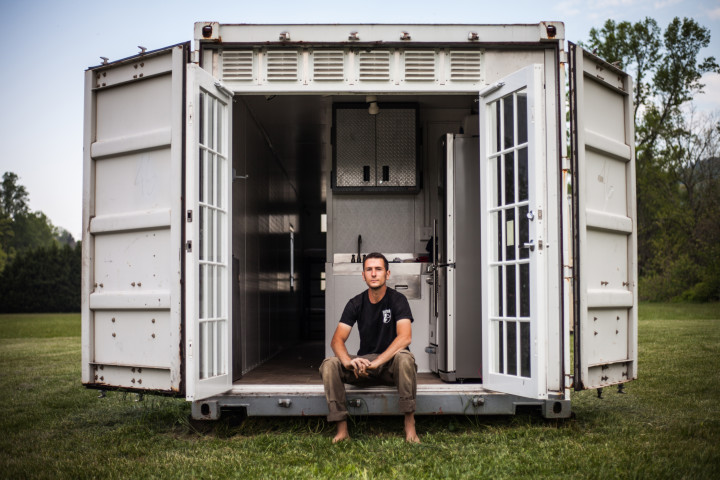
Stripped down and built back up
Much of the philosophy that guides Veterans Healing Farm has been shaped by Mahshie’s own experience as a veteran. Mahshie joined the Air Force after graduating from high school in Hendersonville in the fall of 2000 and took his first post in California in mid-2001. Shortly thereafter came the Sept. 11 attacks on the World Trade Center.
“I was real scared,” Mahshie recalls. “I’m an 18-year-old not knowing what’s going on. Plus my father is Lebanese, and my grandfather Palestinian, and the ticker on the 9/11 news reports reads, ‘Israel suspects Palestinians are responsible’ as the second tower is falling.”
In the weeks following the attacks, Mahshie says the military environment transformed drastically. “There was a lot of animosity toward Arabs,” he says, “I remember my chief master sergeant saying ‘We need to turn that whole damn place into a glass factory.’ … Though in general there isn’t a lot of racism tolerated in the military, there is an exception for ‘sand niggers’ and ‘towel heads.’”
Though the aggression wasn’t targeted at Mahshie personally, being so far away from family and friends in the increasingly xenophobic milieu was pushing him into depression. The final straw came when he received news that his father had been killed in a motorcycle accident on the Blue Ridge Parkway, just 19 days after the towers fell in New York. Mahshie thought he could work through his depression on his own, but his condition soon spiraled.
The experience Mahshie describes, though personal, is not uncommon. A 2011 study of post-9/11 veterans from the PEW Research Center found 52 percent of combat veterans and 30 percent of noncombat veterans reported having emotionally traumatic experiences while in the military. Regardless of whether they had been formally diagnosed, 37 percent of the veterans surveyed believed they suffered from post-traumatic stress as a result.
For six months, Mahshie tried to escape his depression through sleep, but his conditioned worsened. When offered an opportunity to go on a Christian mission to Mexico coordinated with the military’s chapel, Mahshie signed up. “What I discovered [in Mexico] really transformed my way of thinking,” he says. “I was surrounded by people who were in really tight financial situations, and yet exuded nothing but joy. It changed my life.”
Over the next two years before being discharged in 2004, Mahshie went on seven of these missions, where being immersed in the vibrant synergy of self-sufficiency and strong community helped him realize how vital staying engaged with others is to physical, mental and emotional health.
But even after his discharge, Mahshie says he couldn’t shake the emotional toll of his father’s death and war-time military service. As a soldier, the military “strips you down and builds you back up,” Mahshie says, noting that the process is both desensitizing and isolating. “There is so much KILL! KILL! KILL!” he says, explaining that “pulling the trigger” does not come naturally.
Mahshie vehemently opposes labels, especially when it comes to mental health. “To some degree or another” every person is dealing with mental health issues, he says. “There is no normal.”
Still, Mahshie admits that after leaving the service he eventually sought help privately and was diagnosed with post-traumatic stress disorder. “I slept out on the couch for my second child’s last trimester because I wake up swinging and I almost punched my wife in the belly,” Mahshie recalls. “I wake up with night terrors. … I’ve got about 10 ways that I’ve thought about killing myself, and I hate that my mind works that way.”
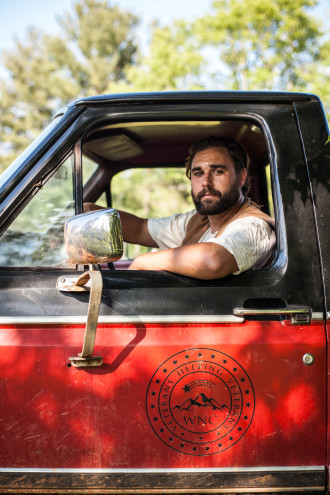
The military does offer mental health services through the Department of Veterans Affairs; however, Mahshie says he wouldn’t tell the VA about his darkest thoughts — an experience that is, again, not uncommon. While a January 2014 report from the VA only cites 10-18 percent of Operation Enduring Freedom and Operation Iraqi Freedom veterans as “likely to have PTSD after they return,” it adds the caveat that only 46 percent of eligible 2002-09 troops made use of VA services. Of those vets who did come into the VA, nearly half, 48 percent, were diagnosed with a mental health problem.
Mahshie says the VA’s approach to healing is fundamentally misaligned and plays into society’s stigmatization of mental health problems. The approach is to treat the symptoms, leaving the underlying problem unresolved.
“Many of the depression symptoms are a result of isolation,” Mahshie asserts. “We just keep loading on prescriptions as new symptoms pop up until eventually a guy is on 10 medications and wants to kill himself.” The delirium and disassociation that medications can create often exacerbates the common tendency in transition veterans to try to get through their depression alone, Mahshie adds.
Of course, not all veterans have traumatic experiences in the military. Even for those who do, many consider their time in the service to be a positive experience, yielding friendship, camaraderie and a common mission that can be far more scarce in the civilian world. Whether they’ve experienced trauma or not, one of the greatest challenges many veterans face is a sense of aimlessness when transitioning.
“When you go into the military, you take an oath to protect and serve your country, and that’s not an oath that expires,” explains Matthew Shepley, executive director of Veterans Helping Veterans of WNC. “I think a lot of vets — myself included — get out wanting to do something meaningful that’s going to have a positive impact and help the people around us.”
Shepley notes that veterans are an at-risk demographic. Transitioning from the mission-driven military to ordinary 9-5 civilian life is often when vets slip into unemployment, depression or homelessness. Shepley reveals that when he was first discharged from the Marines, he spent months couch-surfing, unable to find the direction necessary to secure housing or employment.
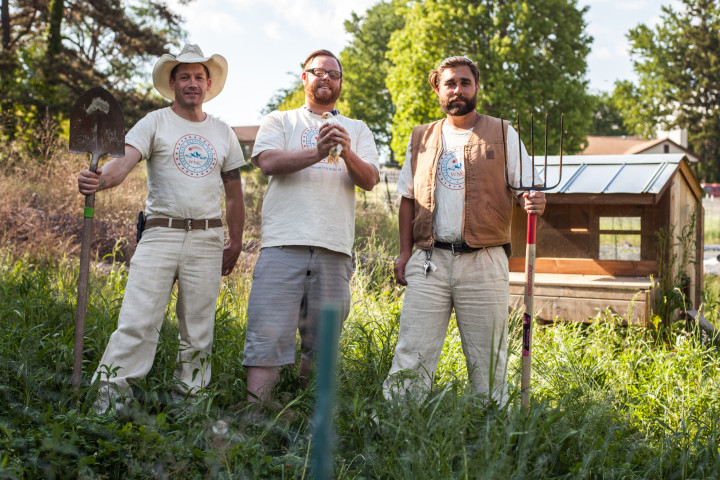
To protect and to serve
In the dimly lit, wood-paneled living room of his small farmhouse, Shepley sits at his desk, diligently combing the Internet to find cheese recipes. Shepley and a handful of other veterans living on this 3-acre West Asheville homestead will make use of gallons of milk regularly donated by Whole Foods before it spoils. “We’re trying to create a system where there is minimal waste,” Shepley says.
The two-bedroom house sits on a gentle, grass-covered ridge in Deaverview that Shepley purchased with his grandfather, a veteran of World War II. Currently, the homestead is used by a small group of veterans who have served in Korea, Vietnam or the first and second Gulf Wars either to live or to share in a foray into sustainable living.
Starting this season, the site’s small working farm — which includes a garden managed by Sunil Patel of Patchwork Farms — will provide produce and meat to local restaurants, tailgate markets and grocery stores, as well as provide veterans with training in self-sufficiency and organic agriculture. Through a partnership with the Department of Commerce and the VA, the organization also offers a program that helps vets access their GI Bill to pay for job training in sustainable industries. The funds from the bill subsidize half the veterans’ wages for their first six months as an incentive for employers to hire vets and plug them into meaningful work.
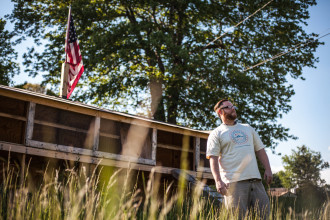
The goal of Veterans Helping Veterans is to offer alternate routes for vets to carry out their oath and keep to the mission of serving their country — not through warfare, but by focusing on building sustainable communities. Because of their training, mission-mindedness and work ethic, veterans are a powerful resource for implementing positive community transformation, Shepley explains. “The farming serves a lot of purposes,” he says. “The vets getting their hands in the dirt and growing things is therapeutic in itself. But growing good food that is consumed on-site and sold at the local farmers market is even more empowering.”
Plugging veterans into this work is also critical for combating unemployment, an issue that greatly impacts returning veterans. A 2009-13 community survey by the U.S. Census Bureau reports a 9.7 percent unemployment rate for veterans living in Buncombe County as opposed to 8.2 percent for civilians. For Henderson County, the figures sit at 11.7 for vets and 9.1 for civilians, respectively.
“What we’re talking about really is in the interest of national security,” says Timothy Sadler, outreach coordinator for VHVWNC. “We’re talking about rebuilding infrastructures in energy, food and housing — this is all in national security interests. I’ve seen veterans really resonate with the idea of being able to continue their service in civilian life.”
Wishbone Tiny Homes is currently the program’s pilot employer partner, “but there is also a new solar manufacturing plant that will be hiring at least 10 vets in the next three months,” Sadler adds.
Shepley and Sadler have high hopes for the viability of their model and eventually plan to export it to other communities around the nation. “We’re at a point in time where the concept of sustainability really has hit a tipping point,” Sadler notes. “These efforts in tiny home construction, solar power, sustainable agriculture are all scalable types of jobs.” He adds that VHVWNC hopes to someday persuade the Department of Defense to directly contract with it, connecting vets to the program as part of national security strategy.
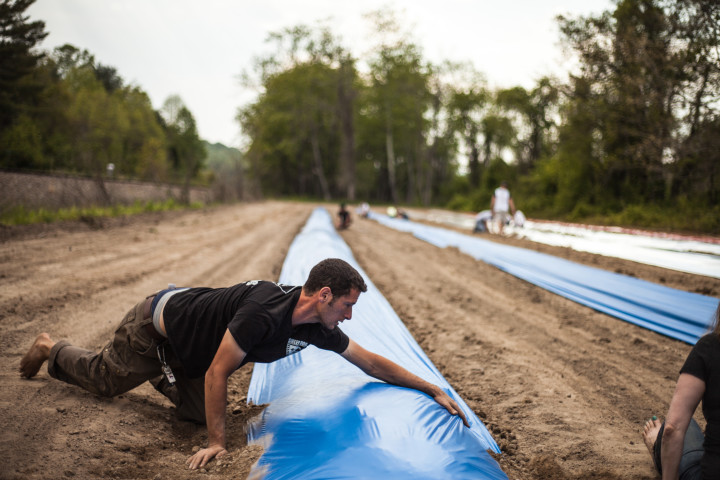
Three cheers for the red, white and blue
The sun hangs over the horizon, casting a warm light on six 300-foot raised beds covered in red, white and blue landscape plastic that will soon serve as Veterans Healing Farm’s donation garden. Mahshie and about a dozen other veterans and their families are on their hands and knees working to embed the plastic’s edges into the dirt before night falls.
“When you get out [of the military] and have just been inundated with death, to have the opportunity to cultivate life, to nurture it, to take a seed and put it in the ground, tend to it and then have it bear fruit — that heals your soul, your mind and your body,” Mahshie reflects. “With your feet touching the earth— the whole system creates this environment that is more therapeutic than any other.”
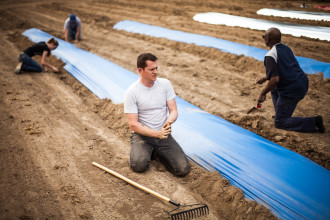
As he shovels handfuls of dirt onto the edges of blue plastic, Ryan Fogerty, an Air Force veteran, notes, “Community is the top — it’s the best part of this.”
Glancing at Mahshie, Fogerty adds, “I also feel like I can come out here and support him too. He’s the one that started this, but he needs this more than anyone else does, you know? Because he’s looking for a mission, but he needs people to support him in it.”
If Mahshie is on a mission, part of his goal is to see his vision spread. He says he hopes Veterans Healing Farm will become a model that can be replicated elsewhere throughout the country.
Walking past the two off-grid upfitted shipping containers on the grassy lawn, Mahshie shares his plans to create a vertical flower garden on the exterior wall of one, using red, white and blue flowers to form the image of a huge, living American flag. “These shipping containers were once filled with useful items, packed full of purpose and sent across the seas only to sit empty on some loading dock when their mission had expired,” he says. He smiles and adds, “They’re just like vets, and that’s why I love repurposing them for this project. Look at them now — their mission isn’t over.”
This story is part of a series of articles looking at issues affecting minority farmers in WNC. Xpress will continue exploring this topic throughout the growing season.


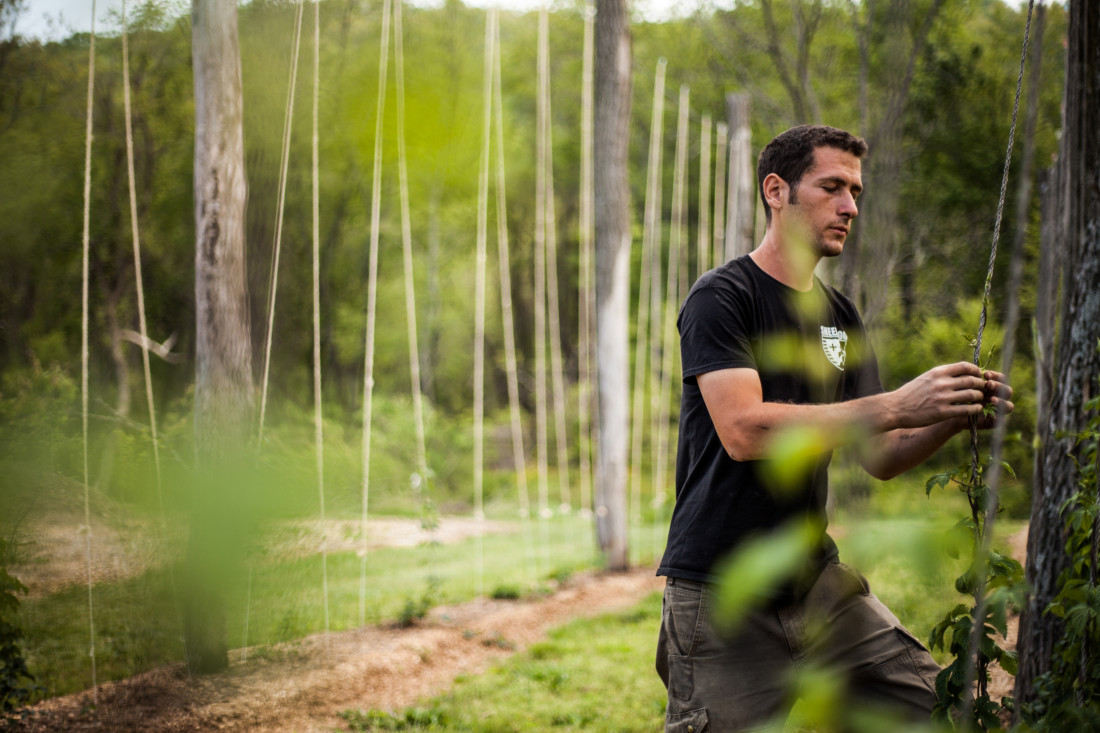


I love your tag line, Jordan “Exploring the subtle and esoteric aspects of what drives and inspires people to take action— including religion, spirituality, ethics, and aesthetics.” And we love John & Nicole and their big, deep hearts. Thanks for sharing their hearts poured out onto the earth and into lives in a way that only folks who have walked that road, can.
I have known John since the day he arrived in California. He has been this way from the day we met. He has always been one to help anyone he can. Although I was not always worthy of such a friend, I was glad to call him one.
Hello and thank you for writing this article! I love this! I think this is the greatest thing going for recovering veterans! I myself am a disabled vet, but not for the reasons todays vets are suffering for.. I would love to help in anyway I can! I manufacture greenhouses kits and am all about homegrown farming! I would love to interact, support, assist and help in anyway to develop more programs for Vets , I would be especially interested in opportunities to be had or made in Texas. I can be reached most anytime on my cel phone, by email or by text!
Thank you for this article!
Sincerely,
Eric Selinger, Owner
ThermaGro Greenhouse Manufacturing
P.O. Box 5026
Midland, Texas 79704
432.349.2994
eric@thermagro.com egs567@gmail.com
http://www.thermagro.com
Hi Eric,
What a sweet offer! Just in case this comment isn’t seen by the right folks, here’s where you can find contact info for Veterans Healing Farm (http://veteranshealingfarm.org/contact) and Veterans Helping Veterans WNC (http://vhvwnc.org/contact/)
What an inspiring story! The honesty and transparency of Mahshie and Shepley is soul-stirring and so appreciated. Their openness lets other veterans (and others), who are struggling every day, know that they are not alone. Such a critical mission that is both life-saving and community-building. We salute you both!
This was a good article, and I have no criticisms with its’ content or context, but I would like to point out that there are a great many of us veterans out there who do NOT suffer from PTSD or other afflictions brought about by military service. It seems like every article that Mountain X and other leftward leaning (not that there is anything wrong with that) publications print about veterans is about vets with social dysfunctions or mental illnesses, which suggests that military service is inherently harmful to everyone’s mental health. This is probably due to the Left’s unshakable opposition to war in general, as well as their distaste for the rigid discipline of military life which discourages the free-thinking that the Left believes that only they enjoy. These attitudes translate into a general dislike of the military and therefore a worldview in which vets must all be somehow damaged by their time in service.
I would counter that the reasons why their SEEMS to be so many vets who have difficulty reintegrating into the civilian peacetime world is:
1) Most veterans entered the military right out of high school and were not socialized into the adult civilian population to begin with. On their first day out of uniform, most have never known what it means to live on their own without Mommy and Daddy (or a fatherly sergeant) telling them when to eat, sleep or work.
2) Despite the military’s smaller size and their best efforts to recruit soldiers with some college in order to better understand the technology that the modern military utilizes, they are still forced to fill their quotas with kids for whom High School or a GED are their highest achievement (which is not saying much given the deplorable state of public education).
3) while the legal drinking ages is still 21, most 18-year-old recruits quickly pressured by their new peers into the “adult” practices of alcohol and tobacco consumption, which are both gateway drugs into polysubstance abuse and the myriad of dysfunctions that accompany them, namely alcoholism, pot-induced paranoia, and the self-indulgence and indiscipline that accompanies Addictive Personality Disorder.
I could go farther to say that all of the above characteristics also apply to many kids who go straight from high school into college, indeed I would speculate that there are probably more ex-college kids who suffer from these disadvantaged states than veterans. Yet we do not apply the same nobility to other mentally ill persons as we do to vets.
All we hear from the Left is what victims our veterans are and how they deserve better. Why do they “deserve better”? I served 3 years of active duty and 9 years as a reservist. I was fed, clothed and housed as well as given medical and dental benefits and life insurance. I collected the GI Bill and Army College fund and it paid for all of my schooling to become a medical professional, as well as exposing me to my profession, which was one that few in my family or social circle had any contact with. Some of my service was in wartime and some engaged in life-threatening activities such as handling explosives and parachuting. I have no complaints about any of it , in fact I am grateful for all I received.
I left the service with no physical or mental disabilities and no sense of entitlement, yet everyone I meet, upon learning of my veteran status, treats me like a victim of some atrocity. Every “thank you for your service” is tainted with the tone of “we are so sorry that we as a society DID that to you” (never mind that I volunteered and was neither drafted nor abused).
I guess all I am asking is for SOME acknowledgement from the Left that while there are vets who are suffering, not all suffering is due to being a vet. I don’t know how this can be accomplished, and I will not hold my breathe waiting, as I know full well the distaste and disrespect that most on the Left hold for the military, but I just cannot remain silent while the narrative on veterans is constantly being written by those with an axe to grind against the military.
Big Al: thanks for your thoughtful comments. They deserve to be heard and considered. Lots of good points.
Hi, all. We just took down a series of exchanges that violated Xpress’ policy about online comments. No personal attacks or libelous material are permitted in the comments. You can find all the rules at the bottom of the home page under “Terms & Privacy.” Thanks.